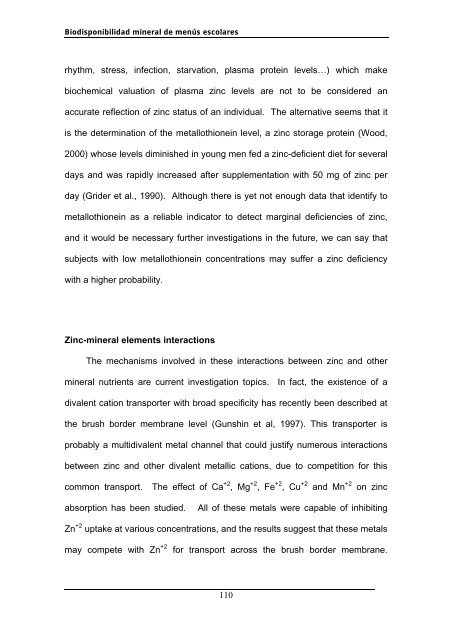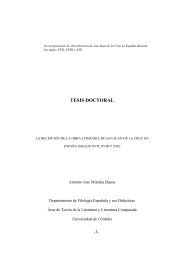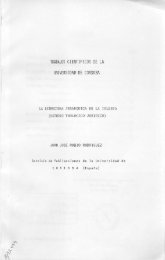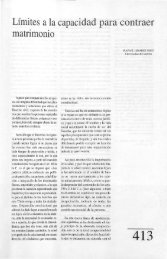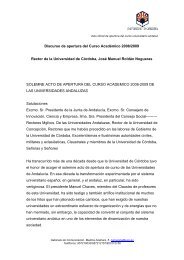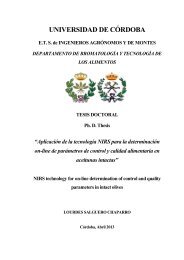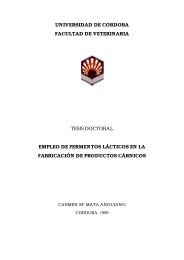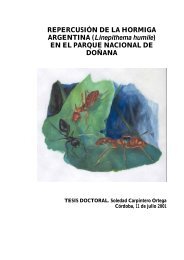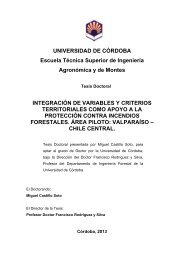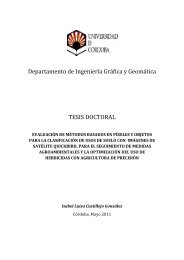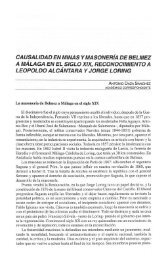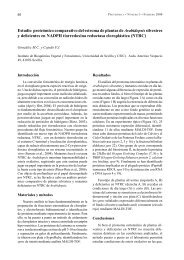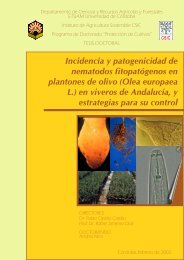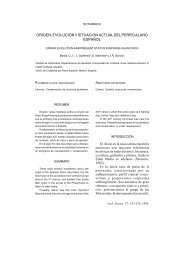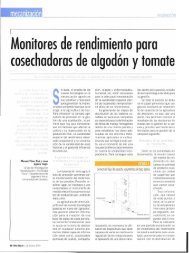- Page 1 and 2:
Dpto. de Bromatología y Tecnologí
- Page 3 and 4:
FACULTAT DE FARMÀCIA DEPARTAMENT D
- Page 5 and 6:
Todas las cosas que pasan en nuestr
- Page 7 and 8:
Agradecimientos Los agradecimientos
- Page 9 and 10:
Finalmente, al Ministerio de Educac
- Page 11 and 12:
Determinación del contenido minera
- Page 13 and 14:
Introducción I.1. Evolución del c
- Page 15 and 16:
Introducción refleja en los gastos
- Page 17 and 18:
Introducción - Bajo refrigeración
- Page 19 and 20:
Introducción - contribuir a la org
- Page 21 and 22:
Introducción - incluir en platos c
- Page 23 and 24:
Introducción los minerales son sus
- Page 25 and 26:
Introducción detrimento del hemo e
- Page 27 and 28:
Introducción mineral ó elemento t
- Page 29 and 30:
II. OBJETIVOS
- Page 31 and 32:
III. UNIDAD TEMÁTICA
- Page 33 and 34:
Unidad Temática Los isótopos radi
- Page 35 and 36:
Unidad Temática Métodos in vitro
- Page 37 and 38:
Unidad Temática más utilizada son
- Page 39 and 40:
Unidad Temática FACTORES FISIOLÓG
- Page 41 and 42:
Unidad Temática osteoporosis, hipe
- Page 43 and 44:
Unidad Temática el desarrollo cogn
- Page 45 and 46:
Unidad Temática Para algunos autor
- Page 47 and 48:
Unidad Temática Por todo ello el c
- Page 49 and 50:
Unidad Temática Cobre-ácido fíti
- Page 51 and 52:
Unidad Temática III.3. ESTIMACION
- Page 53 and 54:
Unidad Temática Esta línea fue es
- Page 55 and 56:
Unidad Temática El número de trab
- Page 57 and 58:
Unidad Temática Estimación de la
- Page 59 and 60:
Unidad Temática Tabla 2.- Porcenta
- Page 61 and 62:
Unidad Temática Figura 4.- Efecto
- Page 63 and 64:
Unidad Temática Los porcentajes de
- Page 65 and 66:
Unidad Temática III.4.- APORTE DE
- Page 67 and 68:
Unidad Temática En España existen
- Page 69 and 70:
Unidad Temática Figura 6.- Porcent
- Page 71 and 72:
Unidad Temática Figura 7.- Porcent
- Page 73 and 74:
Unidad Temática Figura 8.- Porcent
- Page 75 and 76: Unidad Temática Figura 9.- Porcent
- Page 77 and 78: Biodisponibidad mineral de menús e
- Page 79 and 80: Biodisponibidad mineral de menús e
- Page 81 and 82: Biodisponibidad mineral de menús e
- Page 83 and 84: Biodisponibidad mineral de menús e
- Page 85 and 86: Biodisponibidad mineral de menús e
- Page 87 and 88: Biodisponibidad mineral de menús e
- Page 89 and 90: Biodisponibidad mineral de menús e
- Page 91 and 92: Biodisponibidad mineral de menús e
- Page 93 and 94: Biodisponibidad mineral de menús e
- Page 95 and 96: Biodisponibidad mineral de menús e
- Page 97 and 98: Biodisponibidad mineral de menús e
- Page 99 and 100: V. RESULTADOS
- Page 101 and 102: Resultados Reference Subject (ISI J
- Page 103 and 104: Resultados Introduction Because of
- Page 105 and 106: Resultados Effect of caseinphosphop
- Page 107 and 108: Resultados Dietary fiber and calciu
- Page 109 and 110: Resultados This effect increase can
- Page 111 and 112: Resultados of milk, by comparing ot
- Page 113 and 114: Resultados BIBLIOGRAFIA 1.- M. Hern
- Page 115 and 116: Resultados 17.- M. Moya, E. Cortés
- Page 117 and 118: Resultados 35.-H. Spencer, C. Norri
- Page 119 and 120: Resultados preterm infants fed a st
- Page 121 and 122: Resultados Reference Subject (ISI J
- Page 123 and 124: Resultados et al. 1999; Black, 1998
- Page 125: Resultados Zinc corporal content On
- Page 129 and 130: Resultados kind of caseinophosphope
- Page 131 and 132: Resultados studied zinc absorption
- Page 133 and 134: Resultados On the other hand, it ha
- Page 135 and 136: Resultados In relation to zinc fort
- Page 137 and 138: Resultados References: Aranda P and
- Page 139 and 140: Resultados Furniss DE, Vuichoud J,
- Page 141 and 142: Resultados Lombardi-Boccia G, Schle
- Page 143 and 144: Resultados Prasad AS (1982): Clinic
- Page 145 and 146: Resultados Spencer H, Kramer L, Nor
- Page 147 and 148: Resultados Figure 1.- Relations bet
- Page 149 and 150: Resultados Summary: Iron is an esse
- Page 151 and 152: Resultados iron bioavailability is
- Page 153 and 154: Resultados Food Lamb Table 1.- Heme
- Page 155 and 156: Resultados Meat factor Equally to h
- Page 157 and 158: Resultados casein before its ingest
- Page 159 and 160: Resultados was bound to 1, 25-β-ca
- Page 161 and 162: Resultados Table 2.- Effects of vit
- Page 163 and 164: Resultados significantly higher in
- Page 165 and 166: Resultados Table 3.- Effects of phy
- Page 167 and 168: Resultados hypocholesterolemic acti
- Page 169 and 170: Resultados It seems that the conten
- Page 171 and 172: Resultados Acknowledgements.- This
- Page 173 and 174: Resultados Berner LA & Miller DD (1
- Page 175 and 176: Resultados Conrad ME & Umbreit JN (
- Page 177 and 178:
Resultados Fidler MC, Davidsson L,.
- Page 179 and 180:
Resultados Hamed MY, Silver J & Wil
- Page 181 and 182:
Resultados Layrisse M, Chavez JF, M
- Page 183 and 184:
Resultados Ohta A, Ohtsuki M, Baba
- Page 185 and 186:
Resultados Sakai K, Ohta A, Shiga K
- Page 187 and 188:
Resultados Vonk AD, Schaasfsma G, D
- Page 189 and 190:
Resultados porcentajes de Fe y Zn b
- Page 191 and 192:
Resultados electron transfer and re
- Page 193 and 194:
Resultados In vitro estimation of t
- Page 195 and 196:
Resultados Standard Ca, Fe, Zn and
- Page 197 and 198:
Resultados mass cut-off value 10-12
- Page 199 and 200:
Resultados Dialysis mineral percent
- Page 201 and 202:
Resultados Table 4.- Solubility min
- Page 203 and 204:
Resultados Solubility and dialysabi
- Page 205 and 206:
Resultados Moody, 2003), and the da
- Page 207 and 208:
Resultados Iron dialysis percentage
- Page 209 and 210:
Resultados Copper Copper contents w
- Page 211 and 212:
Resultados The highest Zn dialysis
- Page 213 and 214:
Resultados Chawla, S., Saxena, A.,
- Page 215 and 216:
Resultados Haas, J.D., & Brownlie,
- Page 217 and 218:
Resultados Miller, D.D., Schricker,
- Page 219 and 220:
Resultados Sebastiá, V., Barberá,
- Page 221 and 222:
Resultados Reference Subject (ISI J
- Page 223 and 224:
Resultados 1. Introduction Speciati
- Page 225 and 226:
Resultados experimented by foods du
- Page 227 and 228:
Resultados Standard Fe solutions we
- Page 229 and 230:
Resultados 2.5. Nonheme Fe (ionic)
- Page 231 and 232:
Resultados Table 2.- Effect of simu
- Page 233 and 234:
Resultados Table 3.- Contribution o
- Page 235 and 236:
Resultados Table 5.- Total Fe, ioni
- Page 237 and 238:
Resultados In potato and spinach om
- Page 239 and 240:
Resultados References 1. Schricker
- Page 241 and 242:
VI. DISCUSIÓN GENERAL
- Page 243 and 244:
Biodisponibilidad mineral de menús
- Page 245 and 246:
Biodisponibilidad mineral de menús
- Page 247 and 248:
Biodisponibilidad mineral de menús
- Page 249 and 250:
Biodisponibilidad mineral de menús
- Page 251 and 252:
Biodisponibilidad mineral de menús
- Page 253 and 254:
Biodisponibilidad mineral de menús
- Page 255 and 256:
Biodisponibilidad mineral de menús
- Page 257 and 258:
Biodisponibilidad mineral de menús
- Page 259 and 260:
Biodisponibilidad mineral de menús
- Page 261 and 262:
Biodisponibilidad mineral de menús
- Page 263 and 264:
Biodisponibilidad mineral de menús
- Page 265 and 266:
Conclusiones PRIMERA La revisión d
- Page 267 and 268:
Conclusiones NOVENA Las contribucio
- Page 269 and 270:
Biodisponibilidad mineral de menús
- Page 271 and 272:
Biodisponibilidad mineral de menús
- Page 273 and 274:
Biodisponibilidad mineral de menús
- Page 275 and 276:
Biodisponibilidad mineral de menús
- Page 277 and 278:
Biodisponibilidad mineral de menús
- Page 279 and 280:
Biodisponibilidad mineral de menús
- Page 281 and 282:
Biodisponibilidad mineral de menús
- Page 283 and 284:
Biodisponibilidad mineral de menús
- Page 285 and 286:
Biodisponibilidad mineral de menús
- Page 287 and 288:
Biodisponibilidad mineral de menús
- Page 289 and 290:
Biodisponibilidad mineral de menús
- Page 291 and 292:
Biodisponibilidad mineral de menús
- Page 293 and 294:
Biodisponibilidad mineral de menús
- Page 295 and 296:
Biodisponibilidad mineral de menús
- Page 297 and 298:
Biodisponibilidad mineral de menús
- Page 299 and 300:
Biodisponibilidad mineral de menús
- Page 301 and 302:
IX.ANEXOS


